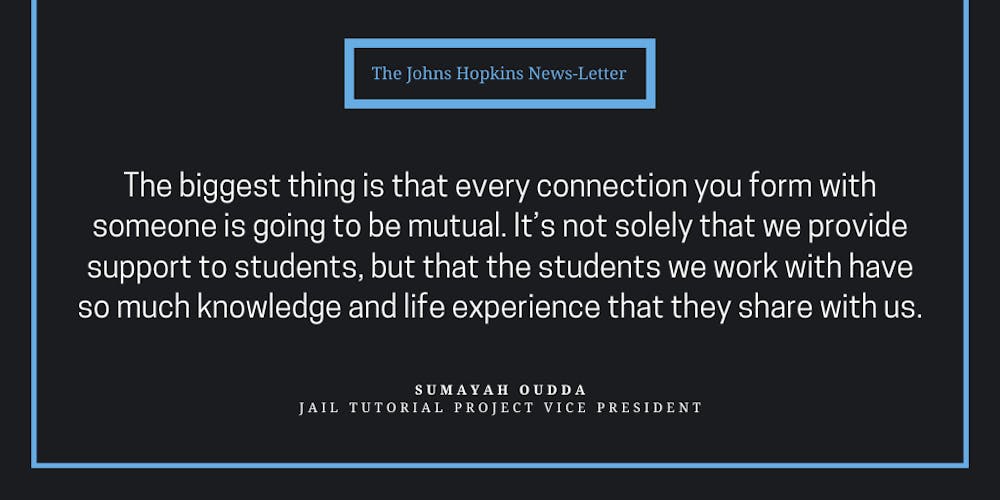Founded in the 1980s, the Jail Tutorial Project (JTP) connects Hopkins tutors with various organizations in Baltimore to provide educational support to veterans, children and incarcerated men and women in the city.
In an interview with The News-Letter, junior and JPT Club President Anna Tang explained how the club’s mission intersects with education and incarceration.
“Education is basically a crucial part of getting out of prison, staying out of prison and being prepared to be in a general society. What JTP really tries to do is to give supplementary help,” she said. “We do not have the means to build these programs; instead, we work with a bunch of community partners, provide them with volunteers and work out transportation for them.”
These community partners include organizations such as the Goucher Prison Education Partnership, The Baltimore Station, Center for Urban Families and Baltimore Youth Arts.
Each subdivision is associated with different training and orientation programs that prepare members to tutor in subjects ranging from music theory to Spanish. Additionally, there are opportunities to assist tutees with earning GEDs, degrees and trade licenses, working on applications and art education.
In an interview with The News-Letter, junior Sumayah Oudda, vice president of JTP, described the orientations and tutoring sessions with the Goucher Prison Education Program.
“We take the Hop vans and all the tutors to drive together to the Maryland Correctional Institute in Jessup, either the men's or the women's prison. We do our tutoring sessions during their study hall, and then we all come back together to the Homewood campus,” she said.
Junior Toby Mao discussed his experience working with The Baltimore Station to offer educational support for veterans in an interview with The News-Letter.
“You help out, and you meet a lot of different people and veterans. You get to really understand their past, their experiences. By understanding their story, you realize how important getting this certification or degree is, and you want to help them more,” he said.
Oudda noted how, in addition to in-person tutoring, the club works with different modalities, educational subjects and age groups.
For instance, the Prison-to-Professionals program, which provides long-term mentorship to people with criminal convictions, offers services to people outside Baltimore, so tutors may interact with students virtually.
“We provide academic support for people who are currently or were previously incarcerated. We also provide tutoring for other communities such as adult learners who are earning their GED or their trade licenses, as well as children in Baltimore, who either have parents who have been incarcerated or children in Baltimore who simply want to learn the arts and the sciences,“ Oudda said.
Additionally, the club combines tutoring with social media advocacy, fundraising and presentations to raise awareness about topics such as housing discrimination, the school-to-prison pipeline and representation of incarceration in the media.
In an interview with The News-Letter, sophomore Antonio Giuseppucci discussed the impact of JTP in addressing the harmful preconceptions surrounding incarcerated populations.
“People that have been incarcerated are sometimes demonized by society, and the club’s a really good way to change perspectives and open people's minds,” he said.
Oudda elaborated on some of the different events hosted by the club, emphasizing that it fosters growth for its tutors as well as its tutees. Socials and presentations are held throughout the semester, offering opportunities for members to learn from professionals who have experiences in these fields and to interact with peers on campus.
Tang spoke on the club’s collaboration with the Race, Immigration and Citizenship program at Hopkins, which hosts events and classes surrounding these topics.
“We’re trying to get people into their classes. We think that once people start taking their classes, they'll drive their friends into them, and then the classes will get bigger and bigger and hopefully form a pattern,“ she said.
Mao highlighted what he’s taken away from his time being a tutor at the Jail Tutorial Project.
“We tend to form preconceived judgments about someone based on their past and underestimate what we can do to help other people grow. In my future interactions with people, I want to focus on how I can nurture them, rather than focus on the past,” he said.
While describing her experience in the club, Oudda emphasized the learning opportunities she’s fostered at JTP.
“The biggest thing is that every connection you form with someone is going to be mutual. It’s not solely that we provide support to students, but that the students we work with have so much knowledge and life experience that they share with us,” she said.





